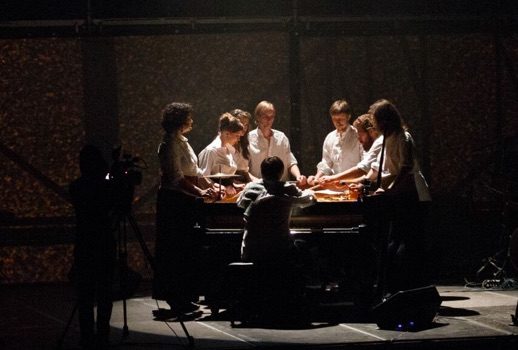
Sumerian wood sculptures of a man in torment alternate with electric iconostases.
“Iyov” is Hebrew for “Job,” as in the Biblical Book of Job. There is some difficulty in describing just what IYOV the musical occasion is—and I’ll take refuge in calling it a musical work in the current PROTOTYPE Festival, through Saturday at HERE, on Dominick Street, between Soho and the Holland Tunnel.
There is a familiar recited text from the Book of Job and there are six powerful singers elaborating on the occasion with an entirely different text, that of the Latin Requiem. There’s a piano, a cello, drums, cymbals, a whole lot of projection going on. There is much that is improv and aleatory. There are effects that are sublime.
In a talkback after the enthusiastically received Tuesday night performance (second of five), the two Ukrainian composers, Roman Grygoriv and Illia Razumeiko, said they feel an urge to tell Old Testament stories, in great part because Ukrainians do not know that part of the Bible very well. But they noted that several quotations from Job have been cited as foreshadowing Christ, and that Job turns up in the Koran as well.
They aim for multi-cult appeal and, as Razumeiko noted, the Bible is central to all western culture. Sequels in the works will deal with the Tower of Babel and the Ark.
Combining texts is part of their message and their method. A speaker proclaims the opening of the Book of Job (in English, but I presume she would read it in the language of any given audience), and other chapters are heard between sections of the performance. She stands above the central prop, a piano, which in turn stands between a cello and a drum kit. Six singers (soprano to bass) stand around the piano like a family gathered for hymns.
Percussion evolves from piano and drums, and though there is a written score, there are many places where the pianist is directed to improvise. (Mr. Razumeiko plays the piano; Mr. Grygoriv leads the singers and sometimes fiddles with the piano strings and cymbals.)
Events in the story of Job are illustrated by elaborate vocal interactions, solo, combinations of two or three voices, full choir. Syllables are broken up or pronounced in contrasting ways, as sound effects, as melisma, but in time the sung text can be understood: It consists of phrases from the Latin Requiem Mass. The beginning of Job’s tribulation is accompanied by “Tuba mirum,” the consolations of Job’s unconsoling friends by “Kyrie,” his ongoing trials by “Lacrimosa dies illa,” the forgiving conclusion by “Agnus Dei.”
There is no exact correspondence, and there is no reference to any particular setting of the text; the two parables, with Job as a metaphor for the tribulations of any questing soul, are intertwined. Phrases of melody may recall ancient music.
The singers are Mariana Holovko, Ruslan Kirsh, Andrii Koshman, Hanna Marych, Yevhen Rakhmanin and Oleksandra Turyanska. This is not a drama, exactly; none of the singers “plays” a specific role. Their vocalizations might be lingering echoes of the sermon expressed in the readings. The improvisatory pianist, the drummer on many different sorts of drum, and the cellist, who takes over after the Sturm und Drang to calm us down for the resolution of the tale, all drift, emerge, die away.
I should emphasize that this is not a classical “prepared” piano but one enhanced with microphones, plucked and strummed by the performers (or else cymbals are stuck among the strings to echo this tone or that). All the instruments and the voices are amplified (though the HERE space is quite small) in order (the composers remarked) to render all the sounds equally audible.
There is an arc in the score from the startling percussive opening (the drummer is Andrii Nadolskyi) and the abrupt rhythmic transformations as we follow Job’s “adventures” to a more soothing choral dynamic as he comes to accept his inexplicable plight. The Book of Job has never had an easily graspable message; one reaches for mystical understanding, and this is expressed, at last, by the smoother, more temperate harmonies of the final sections and the soothing cello of Zhanna Marchinska. Voices are allowed to bloom and fulfill themselves. Tonality relaxes and resolves.
But all this sonic description omits the visual aspect of IYOV, which is equally as striking, wide-ranging, attention-grabbing, and improvisatory. Video mixer Mariia Volkova plays with the ceremonial activity of the performers as well as programmed images. Hands on the piano seem to be birds nesting. Sumerian wood sculptures of a man in torment alternate with electric iconostases and vague, veiled close-ups of this or that singer shot in real time, while they perform.
If there were a drama being enacted, all this busyness would be a distraction, but the music alone can keep up with it, and the music alone is the action before us. Job, like the dying soul in the Requiem, is meant to represent everyone, and it is his pilgrimage to understanding that we are meant to share.
Photo: Vasyl Osadchyi


